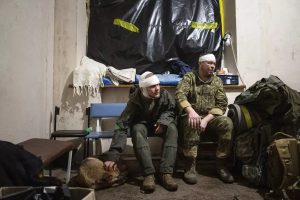Zoé Tkaczyk
Impunity Watch News Guest Writer
THE HAGUE, Netherlands – On January 31, 2024, the ICJ delivered a landmark judgment in the Ukraine v. Russia case concerning the Application of the International Convention for the Suppression of the Financing of Terrorism (ICSFT). The Court investigated Russia’s alleged violation of five articles and found the nation only violated one. While the Court dismissed most of Ukraine’s allegations, it did investigate and find that Russia failed to fulfill its obligations under the ICSFT by not adequately investigating terrorism financing.
 |
The first case was filed in 2017 by Ukraine under the ICSFT. It claimed Russia’s support for Russian separatist groups in eastern Ukraine, including in-kind contributions of weapons and training, violated the ICSFT. As part of that claim, Ukraine also argued that Russia violated the ICSFT by failing to investigate, prosecute, and extradite perpetrators guilty of financing terrorism found in Russian territory. The Court rejected all of Ukraine’s other claims under the convention largely because of insufficient evidence. This sliver of a win seemed to do little as Ukraine lost on nearly every other claim of significance.
The situation today is much different than when Ukraine first raised these complaints. This time around, Russia based its objection on the “clean hands” doctrine, which it raised in its Rejoinder on March 10th, 2023. Raising this objection at this late stage meant the Court viewed it as a defense on the merits. Several of the pieces of evidence submitted by Ukraine were already considered in the 2019 Judgement concerning the annexation of Ukraine
Aside from the acts Ukraine referred to by the Donetsk People’s Republic (DPR) and the Luhansk People’s Republic (LPR) after 2019, Ukraine also referred to the acts of armed groups and individuals before 2019. Because the Court previously issued a judgment, the Court had tricky subject-matter jurisdiction questions to untangle, especially as the timeline of events became increasingly muddled. Ultimately, the Court determined there was jurisdiction under Article 24, paragraph 1, and entertained claims. This did limit the evidence and acts the Court could consider and narrowed the scope of the investigation significantly.
The Court did find that Russia violated its obligations under Article 9 of the treaty, related to the mandatory investigations of financing terrorism. An allegation alone is enough to invoke the investigation obligations since the treaty requires a low evidentiary threshold to investigate alleged terrorism financing. Because the Article had a low threshold, it was the only apparent “win” for Ukraine. Many regarded the proceedings as inadequately protecting the human rights regime. Many speculated that these lackluster decisions indicate that the Court is unwilling to intervene in politically charged situations, especially one rife with military confrontation. Some might wonder whether these lackluster decisions signal that the ICJ is having second thoughts about wading into highly politically charged situations. But the Court must work to preserve its legitimacy, especially concerning cases involving one of the Permanent Security Council members since referral to the Security Council is the only way to enforce an ICJ decision.
No one is contesting that Russia is in violation of international law in waging its war, but the variety of cases brought against Russia by Ukraine demonstrates the limits of international law. While nations can condemn Russia for the acts that they were found guilty of under the ICSFT, if the holding remains unenforceable, it is unlikely that anything will change on the ground. Because of this, it is unsurprising that the Court ruled how it did.
Note: this case was decided in tandem with a ruling on the International Convention on the Elimination of All Forms of Racial Discrimination (CERD).
This article is one of a seven-part series exploring the Russo-Ukrainian War. Zoé Tkaczyk is a J.D./MAIR candidate (May 2025) at the Syracuse University College of Law and Maxwell School of Citizenship and Public Affairs. This article series was inspired by sessions from the Carnegie-Maxwell Policy Planning Lab Fellowship: Postwar: Europe, Ukraine and the Future of European Order. Special thanks to Cora True-Frost and Alexa Connaughton for their guidance, feedback, and edits.